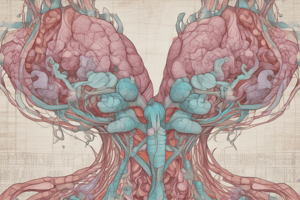Podcast
Questions and Answers
What is the primary function of triiodothyronine (T3)?
What is the primary function of triiodothyronine (T3)?
- Regulating metabolism and energy production (correct)
- Producing thyroid-stimulating hormone (TSH)
- Regulating body temperature
- Influencing growth and development in children
What is the name of the gland that produces thyroid hormones?
What is the name of the gland that produces thyroid hormones?
- Pituitary gland
- Hypothalamus
- Adrenal gland
- Thyroid gland (correct)
What is the effect of high thyroid hormone levels on the body?
What is the effect of high thyroid hormone levels on the body?
- Muscle weakness and joint pain
- Anxiety and rapid heart rate (correct)
- Dry skin and hair loss
- Fatigue and weight gain
What is the mechanism of action of thyroid hormones on target cells?
What is the mechanism of action of thyroid hormones on target cells?
What is the purpose of thyroid hormone replacement therapy?
What is the purpose of thyroid hormone replacement therapy?
What is the role of the hypothalamic-pituitary-thyroid (HPT) axis?
What is the role of the hypothalamic-pituitary-thyroid (HPT) axis?
Flashcards are hidden until you start studying
Study Notes
Thyroid Hormones
Overview
- Thyroid hormones are produced by the thyroid gland, a butterfly-shaped gland located in the neck
- They play a crucial role in regulating metabolism, growth, and development
Types of Thyroid Hormones
- Triiodothyronine (T3): the most active form of thyroid hormone, responsible for regulating metabolism and energy production
- Thyroxine (T4): the less active form of thyroid hormone, converted to T3 in the liver and other tissues
- Reverse T3 (rT3): an inactive form of thyroid hormone, produced in small amounts
Functions of Thyroid Hormones
- Regulate metabolic rate and energy production
- Influence growth and development, particularly in children and adolescents
- Regulate body temperature
- Affect heart rate and cardiac output
- Involved in the regulation of muscle strength and tone
Mechanism of Action
- Thyroid hormones bind to specific receptors in the nucleus of target cells
- This binding activates gene transcription, leading to changes in protein synthesis and cellular metabolism
- Thyroid hormones also have non-genomic effects, influencing cellular signaling pathways and ion channels
Regulation of Thyroid Hormones
- Thyroid-stimulating hormone (TSH) from the pituitary gland stimulates the thyroid gland to produce thyroid hormones
- Thyroid hormones, in turn, feedback to inhibit TSH production
- The hypothalamic-pituitary-thyroid (HPT) axis regulates thyroid hormone production and balance
Clinical Significance
- Hypothyroidism: a condition characterized by low thyroid hormone levels, resulting in fatigue, weight gain, and dry skin
- Hyperthyroidism: a condition characterized by high thyroid hormone levels, resulting in weight loss, anxiety, and rapid heart rate
- Thyroid hormone replacement therapy is used to treat hypothyroidism and thyroid cancer
Studying That Suits You
Use AI to generate personalized quizzes and flashcards to suit your learning preferences.




